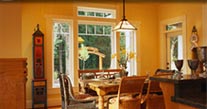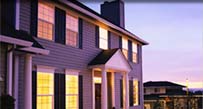Sound Performance: Are additional panes more beneficial?
Source Post: http://www.replacement-windows.com/windowbb/viewtopic.php?p=6810BestValue, as a general rule, a triple pane will not significantly improve sound performance over a dual-pane IF the overall airspace is the same on both types of IGU.
The Canadian study referenced by Stephen Thwaites is an outstanding resource and I highly recommend that anyone who is interested in sound performance read it...I happen to have a hard-copy of that report in my book of "cool-stuff".
In that study you will have noticed that there are situations where a single lite of glass will actually outperform (sound) a dual pane IGU at certain frequencies. You may also have noted that the dual pane IGU in that example had a 1/4" airspace between the lites. It is the width of the airspace that is significant in that example.
Without going into lots of formulas and calculations, the 1/4" width of the airspace can actually enhance the transfer of specific frequencies thru the unit - this has the effect of actually limiting the effective sound attenuation in that particular make-up. Basically, the wider the airspace in the IGU, the better the overall sound performance...1/4" airspace is not the best for sound attenuation.
As pointed out in the reference, a triple pane with two 1/4" airspaces will have the same STC as a dual pane with a single 1/2" airspace. The potential advantage of the additional lite in the triple pane is off-set by the disadvanatge of the narrower airspace between the lites.
All of which brings us to your original post. Often (almost always) posts asking about sound and the difference between dual pane and triple pane performance simply discuss triple pane versus dual pane without regard to the actual make-up of the units. Your post was different in that you actually listed what the actual width of the airspaces are....we can use those numbers to draw some very general conclusions (not specific conclusions though. Your actual situation and circumstance would have to be evaluated before any sort of precise values could be assigned).
The IGU width (I am assuming airspace and not overall thickness) of the dual pane is 3/4". That is a rather common IGU set-up and is certainly acceptable in terms of both energy and sound performance.
But, the triple pane airspace widths are a very nice start in establishing sound perfomance criteria. The casement has an overall airspace of .96" and the triple pane fixed is 1.084" overall airspace width...nice numbers when dealing with residential sound issues. The typical dual pane versus triple pane argument really doesn't apply in this case because of the differences between the triple and dual IGU's.
There is some truth in the salesman's concerns about using two different thicknesses of glass in the IGU. Window glass does flex. It bows and twists and moves with changing winds, barometric pressure changes, thermal stress...etc. There are advantages to having the same thickness in the various panes of an IGU when dealing with these stresses.
Barometric pressure changes, for example, can cause the glass in an IGU to bow concave or convex depending on the high or low of the pressure. It is preferrable to have the panes bow by the same amount so as to avoid over stressing one lite over the other. In other words, if the lites are the same width, they will generally mirror one another's movement.
But, if the lites are different thicknesses, it can put more stress on the thinner lite to bow more than does the thicker lite - under the same stress. In the case of unequal thickness lites, the thicker lite may even bow less than it would in an even-lite-thickness situation forcing the thinner lite to assume a greater percentage of the stress.
Is it a potential problem? Again, like so many issues, it can be very dependent on the specific environment. In the SF Bay area, and using 3mm and 4mm glass (and not thinner), I would consider the risk to be minimal.
As always, install is vital. Even more so when you want to eliminate sound problems. Also, remember that your walls can also pass sound energy, or anywhere that air can leak into your home, sound will use the same access points. Sound is efficient in finding any weakness.
Make sure whatever windows you purchase are tight. A loose window will pass every sound imaginable.
And, as mentioned by several other folks, laminated glass is definitely always an option. In addition to sound attenuation, laminated also offers security from unwanted visitors and it stops 99% of UV from passing thru the window.
And, finally, since you are concerned about railroad noise, there are several government studies concerning railroad and airport noise and noise abatement available. I am not sure if they are available to the general public (although I don't see why they shouldn't be). They do tend to be very technical with lots of charts and graphs and numbers and stuff Shocked but they do have a lot of very good information on how to keep that sort of specific noise out of a house.
Good luck...
Source Post: Dual pane vs Triple pane for sound/noise control
http://www.replacement-windows.com/windowbb/viewtopic.php?p=6810
Posted: Thu Mar 30, 2006 7:48 am




 Call us at
Call us at


